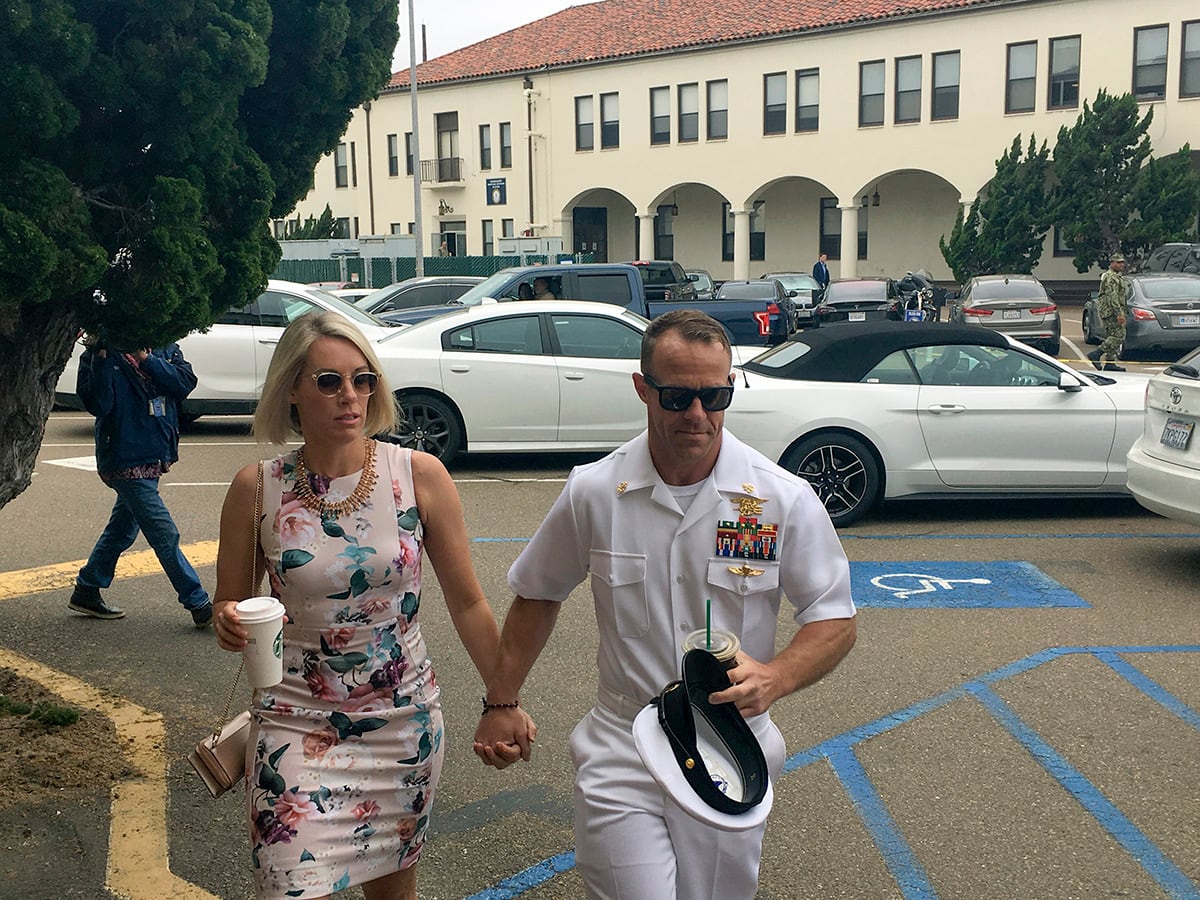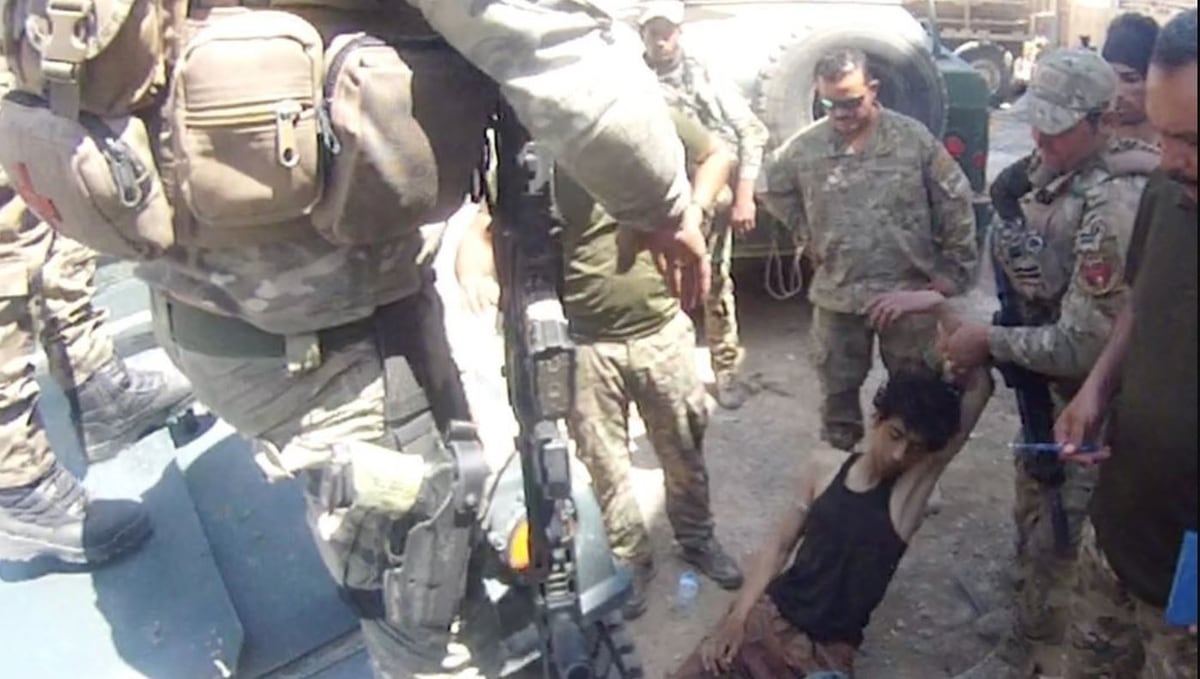More than nine months after he was charged with murder, attempted murder and a string of other alleged war crimes tied to a 2017 deployment in Iraq, Special Warfare Operator Chief Edward “Eddie” Gallagher strolled out of a Naval Base San Diego courtroom a free man, guilty only of appearing in an inappropriate photograph.
Military prosecutors had accused Gallagher, 40, of stabbing to death a seriously wounded Islamic State prisoner of war on May 3, 2017 in a SEAL compound near Mosul, but a military panel composed mostly of combat-tested Marine officers disagreed and acquitted the chief.
Several junior petty officers in Alpha Platoon, SEAL Team 7 also alleged that he had shot at least two civilians from a sniper perch and later tried to cover up his actions, but jurors tossed those charges, too.
Gallagher’s defense team had savaged the witnesses in court as liars bent on usurping a demanding chief they didn’t like and making sure he failed to receive a Silver Star commendation for battlefield heroism.
And in the end a panel of his peers agreed with Chief Gallagher, not a handful of junior SEALs.
Wearing broad smiles, Gallagher’s legal team led by Timothy Parlatore and Marc L. Mukasey emerged from the courthouse shortly after Navy Times learned of the verdict and announced their victory.
“The jury found him not guilty of the murder, not guilty of the stabbing, not guilty of the shootings, not guilty of all those things,” said Parlatore. “They did find him guilty of taking a photograph with a dead terrorist, which we admitted from the beginning he was in that photograph.”
Mukasey called it a “huge victory, a huge weight off the Gallaghers and a huge victory for justice.”
Officials at Navy Region Southwest, the convening authority for Gallagher’s court-martial, did not return messages seeking comment.
Sentencing is slated to resume Wednesday morning in San Diego.
RELATED

On June 21, the prosecution suffered a blow when their star witness, SEAL medic Special Warfare Operator 1st Class Corey Scott, confessed on the stand that he, not Gallagher, ended the detainee’s life by plugging his breathing tube, a mercy killing so the fighter wouldn’t be tortured to death by Iraqi security forces.
A spotter for Gallagher when the chief was a sniper in Iraq — Special Operator 1st Class Joshua Graffam — also told jurors that a Father’s Day shooting in 2017 was a good kill, not a war crime.
Both petty officers were represented free of charge by Brian Ferguson, a Texas attorney and Air Force Reserve major.
“An impartial panel of seven senior service members had the opportunity to evaluate the credibility of the witnesses in the case and returned a verdict consistent with the truthful testimony provided by these two special operators.”
But in a second press conference after court recessed Tuesday evening, Gallagher’s attorney Parlatore traced the collapse of the prosecution’s case to earlier events.
He cited an “aggressive defense” that went directly at prosecutors and Naval Criminal Investigative Service agents for what he described as a botched case tainted by government misconduct.
“The prosecutors got sloppy,” said Parlatore, a former Navy surface warfare officer. “They committed misconduct. They spied on us. NCIS screwed up. And it was a continuous downhill spiral from there.”
On June 3, Navy judge Capt. Aaron Rugh booted lead prosecutor Cmdr. Christopher Czaplak from the case after he admitted to emailing 13 defense attorneys and paralegals — plus the editor of Navy Times — a tracking beacon in a warrantless search for those who were leaking information to the media.
Navy Times had uncovered records that suggested prosecutors and NCIS officials had not only withheld information that could have helped exonerate Gallagher but also hinted at how Scott truly recollected the detainee dying.
“In this case you had so many different things,” Parlatore said. “So many different firsts. I mean, how many times have we heard a forensic pathologist say, ‘I can’t determine cause of death?’ How many times have we had a witness say, ‘Oh, no. I did it.’ How many times have we had a judge find that the prosecutor spied on defense attorneys?
"This is a case of firsts.”
Parlatore called on Navy leaders, especially at Naval Special Warfare, the Office of the Judge Advocate General and NCIS to learn from the many mistakes made in a case he said never should’ve gone to trial.

The maximum jail sentence for posing for photographs with a dead war casualty is four months, nearly half the time he already served during pretrial confinement in San Diego’s Naval Consolidated Brig Miramar.
Citing the highly decorated Gallagher’s service to the nation, President Donald J. Trump ordered him released on March 30.
“President Trump should be working on getting him his Silver Star now,” said Jeremiah J. Sullivan III, the defense attorney representing Lt. Jacob X. “Jake” Portier, the officer in charge of Gallagher’s SEAL platoon.
Now that Gallagher has been cleared, the spotlight falls on Portier’s upcoming trial.
On the day Gallagher was acquitted on all but one minor charge, military prosecutors pressed forward on Portier’s case and obtained a trial date of Sept. 3.
Prosecutors accuse the lieutenant of helping his platoon chief cover up crimes that a jury said Tuesday weren’t committed.
“It defies logic and the plain meaning of justice,” said Sullivan. “They’re going to waste an abundance of taxpayer dollars. But we’ll be ready for trial. One acquittal at a time.”
Prine came to Navy Times after stints at the San Diego Union-Tribune and Pittsburgh Tribune-Review. He served in the Marine Corps and the Pennsylvania Army National Guard. His awards include the Joseph Galloway Award for Distinguished Reporting on the military, a first prize from Investigative Reporters & Editors and the Combat Infantryman Badge.





